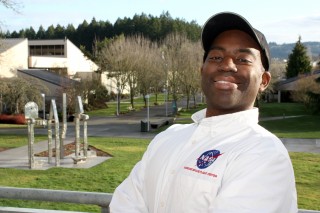This content was published: September 16, 2010. Phone numbers, email addresses, and other information may have changed.
Students Retraining in a Tough Economy: Damani Proctor, Microelectronics
Story by Meryl Lipman. Photo by James Hill.
Damani Proctor’s path to NASA started when he graduated from Embry Riddle Aeronautical University in 2002 and soon found full-time work at a call center four years ago. But within a year the company outsourced his job due to the poor economy and, out of work, he became eligible for retraining at PCC and moved in with his parents to save money. But in 2007 their Portland home caught fire and the family dispersed.

After becoming jobless and homeless thanks to the economy, Proctor found his calling with PCC's Microelectronics Program.
He subsequently had a car accident and the drawn-out financial strain left him homeless for a short time before he found stable housing with friends in Gresham.
Determined to change his fortune, Proctor enrolled in PCC’s Microelectronics Technology Program at the college’s Rock Creek Campus. And quickly found his calling.
Because of his interest and talent in this program, Proctor was selected one of 105 students nationwide for the NASA Student Ambassador Program. The agency uses the program to engage undergraduate and graduate students in NASA science, technology, engineering and mathematics, research and interactive opportunities. Selected students represent 33 states and 81 college or universities from across the nation. Ambassadors interact with the agency while sharing information, making professional connections and collaborating with peers. They also will represent NASA in a variety of venues and help the agency inspire and engage future interns and fellows.
“As a NASA scholar I am beyond words,” said Proctor, who lives in Gresham. “‘Amped’ is probably the closest word to describe it. My hope is a greater outlook on the future in NASA employment. NASA has great opportunities and there is a world of possibilities to explore.”
Last spring Proctor, 36, found out he’d been accepted to the Oregon Space Grants Program and was an intern at the Goddard Space Flight Center in Maryland. He spent three months testing, programming and troubleshooting a system to convert power from 120 to 28 volts.
“The space station runs at 120 volts,” he explained. “But if you convert down to 28, you can run experiments from the shuttle bay.”
His work group, in which he was the only intern, created a prototype of the power conversion system, and it launched in late November. By then Proctor was back at PCC, where he found he’d been nominated as a NASA Student Ambassador. He said he hopes to use the NASA appointment to recruit high school and college students to the various NASA programs by talking about his experiences and performing community outreach.
Proctor is working on his associate’s degree in Microelectronics Technology Program at the Rock Creek Campus. After PCC he aspires to use his two degrees to find work in the solar electronics industry, hopefully with SolarWorld in Hillsboro.
